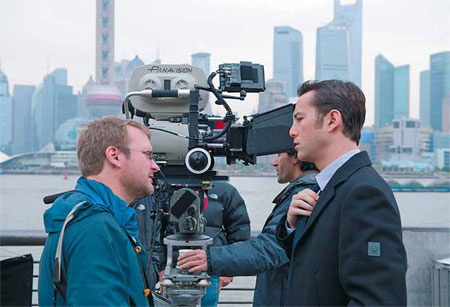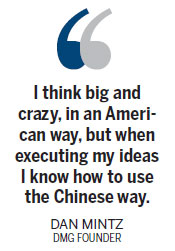DMG DNA
 |
|
American actor Joseph Gordon Levitt (right) on the set of Looper in Shanghai. Photos provided to China Daily |
 |
|
Dan Mintz believes understanding China and Hollywood helped him turn his advertising agency into a leading player in the Chinese film industry. |

DMG founder Dan Mintz says his company's genetic code is global films with Chinese relevancy. Liu Wei reports in Beijing.
Dan Mintz was in a small lighthouse by Huangpu River, Shanghai, one night in 1995. All traffic had stopped on The Bund. There were no cars on the street by the river, except those that were part of a commercial being shot.
Several trucks had dumped water on the street so it would reflect light when the cars went by.
It was a moment of enlightenment for Mintz and DMG, an advertising agency founded in Beijing by the New Yorker in 1993 - three years after he arrived in China.
"I was thinking to myself, OK, now you can do something here, something different, not just copy and paste," he says.
China was experiencing rapid changes in the early 1990s, shortly after its reform and opening-up. As a Brooklyn, New Yorker, Mintz is quick to find opportunity when there are changes.
He had made several films by then and was scouting locations for another in China, when he noted that international companies usually shot their commercials in Hong Kong or Singapore, because China had few agencies to do quality work.
So, he founded DMG, a leading player in the industry now, boasting blue-chip clients such as Valkswagon, Nike, Johnson & Johnson and China Mobile.
Nineteen years later, he is back in Shanghai to shoot a Sino-US-produced film.
It is called Looper and stars Bruce Willis, Joseph Gordon Levitt and Chinese actress Xu Qing. It deals with the theme of time travel and will premiere in China on Sept 28.
Mintz says China was not included in the original storyline, until DMG teamed with Los Angeles-based Endgame, a privately funded film, TV and theater company.
"Global films with Chinese relevancy, that's our DNA now," says Mintz, who speaks fluent Chinese and bursts into slang from time and time, such as luzi, which means guanxi (connections).
Mintz has built connections with The Walt Disney Company and is partnering with the group to produce Iron Man 3, the latest installment of the superhero franchise.
DMG will not only invest in the film, but also jointly produce parts in China. Shooting has started in the United States. Release is set for May 2013.
It is the first time a Chinese production company has taken part in a tentpole Hollywood film, but Mintz thinks DMG was chosen for good reasons.
"When we talk about co-productions we think of geography, language, culture, filmmaking skills, understanding of China and Hollywood," he says. "Who can jump over all these barriers and make it to the center? When you think about the list in China, there is just one."
China has been the largest overseas box office for many Hollywood films in recent years, including Avatar and Kung Fu Panda 2.
The rapid growth of the box office, reaching 13 billion yuan ($2 billion) in 2011, projects a tempting new market for Hollywood, which has seen stagnant theater admissions in North America.
Yet China imports only about 50 foreign films a year, while co-productions are treated as domestic films and exempted from the quota. Therefore, co-production has become an initiative some Hollywood studios choose to enter the Chinese market.
As a filmmaker, Mintz believes in the power of stories, even more than money. While some people in the industry are obsessed with co-productions, he sees it in a different way.
"Hollywood cares about the Chinese market, but not as much as many think," he says.
He refers to smash hits, such as Mission Impossible 4 and Avengers, which made huge money at the box office but have no Chinese elements.
"The Iron Man series has been very successful around the world. They don't have to work with China to be popular," he says. "If you sit down and talk about cooperation regarding a tentpole film, you need to add some value to the story."
While Iron Man 3 is at a stage when details are not available, Mintz turns to Looper - in which assassins travel into the future and past to fulfill their missions - as an illustration. The real challenge, he says, is to infuse Chinese elements into the story while not damaging its global appeal.
"The key is China means something to the story," he says. "The city is a character, like any other character. It's not about did I see The Bund, the Great Wall, or not. The question is, if the character is changed by the place, is he or her affected by that place."
When Mintz first came to China, he spoke no Chinese at all. The best thing that happened to him, he says, is he never worked in an office. No secretary or translator was at hand, he learned fast, not only the language, but also the way of getting things done in China.
He talked to everybody - from the mayor of Shanghai to an old man who had the keys to a warehouse he needed for shooting.
"I think big and crazy, in an American way, but when executing my ideas I know how to use the Chinese way," he says. "People skills are essential. I realized very early that the guy with the key is as important as the one above."
He says his most important career connections are partners Wu Bing, a former gymnastics champion, and Peter Xiao, who has tons of connections in the government, film and banking industries.
In 2007, the three set up DMG Entertainment and first put their toes in the film market, based on the fact that China had 5,000 screens, and more importantly, the habit of film going.
"What defines the market in the long run is the habit. Now, they have it," Mintz says. "When people start to ask the question, 'What movie do you want to see this weekend?' that's when it becomes a real market."
It was in 2008 that DMG started cooperating with China Film Group, the hugely influential State-run conglomerate.
DMG took part in Founding of a Republic, Go Lala Go and No Man's Land. Founding was a tribute for the 60th anniversary of the People's Republic of China, in which Xiao played a general among a stellar cast, including Jackie Chan and Jet Li. Lala was a romantic comedy and Land was directed by Ning Hao, one of the most sought-after young directors.
Mintz thinks connections are positive but he does not want to over-rely on them.
"Guanxi does not mean you can sell tickets," he says. "Everybody knows what the box office of your films are. You cannot hide it."






















